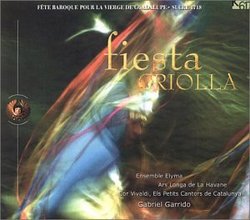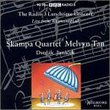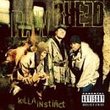| All Artists: Ensemble Elyma, Garrido Title: Fiesta Criolla (Bonus Dvd) Members Wishing: 1 Total Copies: 0 Label: K617 Records France Release Date: 1/14/2003 Album Type: Import Genres: Alternative Rock, Classical Styles: Chamber Music, Historical Periods, Classical (c.1770-1830) Number of Discs: 1 SwapaCD Credits: 1 UPC: 3383510001390 |
Search - Ensemble Elyma, Garrido :: Fiesta Criolla (Bonus Dvd)
 | Ensemble Elyma, Garrido Fiesta Criolla (Bonus Dvd) Genres: Alternative Rock, Classical This "fiesta" is in honor of the Virgin, and contains music by Roque Jacinto de Chavarria, a Brazilian Baroque composer (1688-1719), Juan de Araujo (Chavarria?s teacher) and others. Don?t let their unfamiliarity and the ... more » |
Larger Image |
CD DetailsSynopsis
Amazon.com This "fiesta" is in honor of the Virgin, and contains music by Roque Jacinto de Chavarria, a Brazilian Baroque composer (1688-1719), Juan de Araujo (Chavarria?s teacher) and others. Don?t let their unfamiliarity and the unfamiliarity of the other composers/arrangers on this CD put you off--all the music is flavorful, solid, Baroque fare, and much of it is rhythmically propulsive with an exciting Latin beat. Musicologist Bernardo Illari has put it all together to create a thrilling, vastly entertaining, and unique experience. It winds ups as a veritable pageant, beginning with a drummed entry into the cathedral, followed by the polyphonic sections alternating with purely instrumental ones and some nice monophony as well. Needless to say, Garrido leads his large instrumental and vocal forces with verve and understanding. The CD comes with a DVD including an interview with Garrido and some rehearsal footage which should have been more gripping if they were to include it at all--but why look a gift-horse in the mouth? --Robert Levine Similar CDs
|
CD ReviewsVividly atmospheric "Fiesta"! Maddy Evil | London, UK | 05/07/2005 (5 out of 5 stars) "*** PLEASE NOTE!!! At the time of writing, this CD is unfortunately becoming difficult to obtain in the USA; however, it is worth checking out the amazon sites for France and the UK, since Elyma's recordings generally seem to be easier to obtain there (and often at a cheaper price too!)...*** This recording, undertaken in collaboration with the musicologist Bernardo Illari, aims to recapture something of the exuberance of musical celebrations for the 'Feast of Our Lady of Guadalupe' in La Plata (now Sucre). The programme is organised around the villancico set composed for this event (in 1718) by the talented - but hitherto largely neglected - Roque Jacinto de Chavarria (1688-1719). Chavarria's works are set alongside pieces by his (New World) contemporaries, some better known (such as Juan de Araujo), others not. Listeners new to this repertory may be struck by the archaic style of certain pieces, although these make complete sense in the context of contemporary Iberian music (e.g. the villancicos of Juan Frances de Iribarren [1698-1767]). Other works, in contrast, are more typical of the Italian Baroque style, like Chavarria's 'Salve regina / Parajillos madrugad!' (track 13). In addition, there is a noticeable parallel between Chavarria's style and that of Araujo (his teacher), although Chavarria is often more ambitious, frequently exploiting sonorities of 10, 11 and even 12 parts; similarly, Chavarria's 'criollo' roots (his mother was a 'mestizo') are often apparent, such as in the magnificent climax of the Guadalope set, the 11-voice 'Oigan las fiestas del toros' (track 15), with its refrain in Quechua. The performances by Ensemble Elyma (joined by the ensemble Ars Longa de La Havane and the Cor Vivaldi, Els Petits Cantors de Catalunya) are excellent - indeed, this is probably one of the finest recordings of New World Baroque music currently available. Most pieces are given a suitably colouristic interpretation - voices, strings (bowed and plucked), wind instruments (loud and soft) and occasionally percussion - as it seems was probably the case in the original performances (interested readers should consult literature by Bernardo Illari, Robert Stevenson and Steven Barwick, etc.). The programme also includes some fascinating dance-songs taken from the manuscripts of Don Baltasar Martinez Companon - a pioneering ethnomusicologist and also Bishop of Trujillo (1779-89) - which bear the hallmarks of music still performed in South America to this day (tracks 10 and 19). Whether these pieces would have been as orchestrated as they are here is perhaps a matter for conjecture, although Garrido's interpretations are certainly infectious. [The original manuscripts are accompanied by Companon's own watercolour illustrations, which depict only small groups of musicians - sometimes native Indians, sometimes Creoles or Africans - playing a mixture of Western instruments (like harp and guitar) and traditional ones such as the quijada and the cajita]. The CD also includes a free DVD with extracts from a concert of this programme, and an interview with Elyma's director, Gabriel Garrido. Highly recommended! " Translation between centuries Maddy Evil | 04/23/2003 (5 out of 5 stars) "Fiesta Criolla, is a true representation of a Latino-American "party" that reveals the religious spirits the Colonial period had. It truly makes you feel as you were living it."
|



